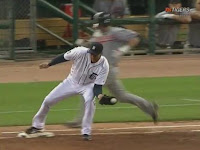Finding the Right Angle
 So much talk of late in the poker world about “angle shooting” and all of the fuzziness that surrounds many of the rules of the game. Not to mention even-harder-to-define things like “sportsmanship,” “etiquette,” and the like with regard to poker.
So much talk of late in the poker world about “angle shooting” and all of the fuzziness that surrounds many of the rules of the game. Not to mention even-harder-to-define things like “sportsmanship,” “etiquette,” and the like with regard to poker.I saw that Prahlad Friedman-Ted Bort hand on ESPN last week just like most of you did, the one from Day 2b of the Main Event. (If not, you can see it here -- go to the 10-minute mark.) That was the hand in which the freestyle-rappin’, freethrow-shootin’ Friedman clearly called of his entire stack to Barking Man Bort’s all-in river shove before the floor person had finished counting down the clock on him. Yet for some reason Friedman’s hand was declared dead, anyway.
Bort tabled his cards, Friedman saw he was beat and mucked, having been improbably afforded a second tourney life. And then (as they say), hilarity ensued.
Over on Two Plus Two much energy has been devoted over the past week to characterizing Friedman’s action as falling into that nebulous category of “angle shooting.” Seems pretty clear, though, that if this were angle shooting, it was a pretty extraordinary, “perfect storm”-type scenario in which to pull off such a ruse.
As far as this case goes, I fall on the side of those who do not believe Friedman did anything particularly egregious or intentional here, but rather was simply the very fortunate beneficiary of a pretty obviously bad call.
The situation recalled for me that bad call made in the should-have-been-perfect game pitched by Armando Galarraga for the Detroit Tigers against Cleveland back in early June. Indeed, I’ve seen others bringing up that example, too, in the context of discussing the mistake at the WSOP.
 After retiring 26 straight batters, Galarraga appeared to have successfully recorded the last out in a bang-bang play at first base, but umpire Jim Jones -- perhaps having had a bad angle on the play, or just suffering from a momentary lapse of some sort -- botched the call, declaring the runner safe.
After retiring 26 straight batters, Galarraga appeared to have successfully recorded the last out in a bang-bang play at first base, but umpire Jim Jones -- perhaps having had a bad angle on the play, or just suffering from a momentary lapse of some sort -- botched the call, declaring the runner safe.I don’t know about you, but I found that story almost unbearable to read about and watch. Indeed just going back and looking at a report on it today made me a little queasy.
I love sports, especially for all of the drama they can produce. But I get no joy out of watching people fail. And I instinctively recoil at seeing a mistake occur when the stakes are so friggin’ high, as this one did.
After the game, Joyce admitted he’d blown the call. Galarraga was incredibly sympathetic to Joyce’s situation. He’d just been on a thrilling three-hour quest for perfection, and now was doing a great job showing the world that he understood that as humans we ain’t perfect.
In the locker room after the game, a reporter informed Galarraga that Joyce had said he’d missed the call and was apologizing for doing so. “Tell him no problem,” was Galarraga’s response. Then he added with a smile: “I should probably talk to him. It will be better.” The two of them did subsequently get together, Joyce apologized directly to the young pitcher, and Galarraga assured him there were no hard feelings.
As sick-making as watching the bad call can be (for those of us who are baseball fans, anyway), Galarraga’s response was about as inspiring as it gets -- one of those special moments of sportsmanship that make us love silly games like baseball all over again.
Going back to the Friedman-Bort hand, a mistake was obviously made. And the stakes were pretty damn high. But that’s how it goes sometimes, when humans are involved. And while I’m not saying forgiveness is always warranted when mistakes occur, it often should be considered as a possible angle to take afterwards.
Especially when it’s games we’re talking about.
Labels: *shots in the dark, 2010 WSOP, angle shooting, Prahlad Friedman, Ted Bort














2 Comments:
Shamus, apparantly "the rules" are that a hand is declared to dead once the floor says "one", not at "zero" - in that case, the call to keep Prahlad in the tournament was the correct one.
Thanks, Brian. Yeah, I heard WSOP TD Jack Effel's explanation & understand how saying "call" after "1" puts the player at the TD's mercy.
I still think the floorperson was too hasty to declare the hand dead here, though I can understand the other view. And I will say that this "mistake" (as I think it was) wasn't as obviously incorrect as the one Jim Joyce made, which I probably imply in the post by making the comparison.
Post a Comment
<< Home